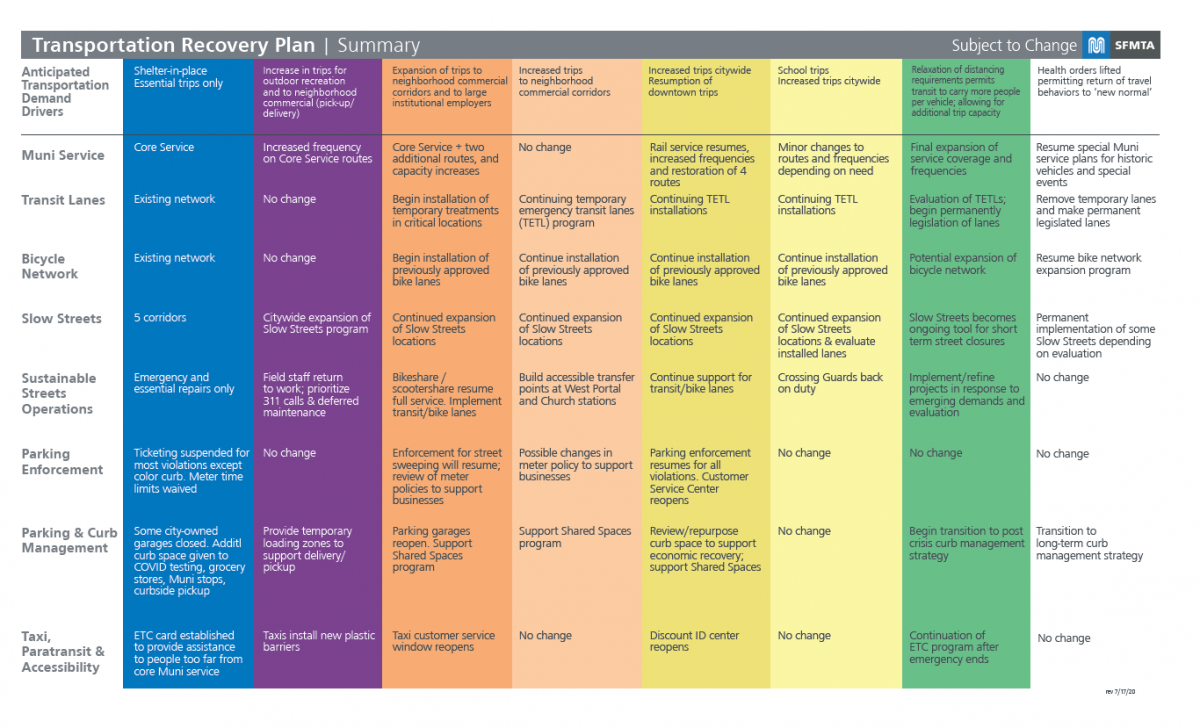San Francisco is currently in Level 5: School trips. Increased trips citywide.

|
|
Level 1 |
Level 2 |
Level 3A |
Level 3B |
Level 4A |
Level 4B |
Level 5 |
Level 6 |
|---|---|---|---|---|---|---|---|---|
|
Conditions |
Shelter-in-place. Essential trips only. |
Increase in trips for outdoor recreation and to neighborhood commercial (pick-up/ delivery). |
Expansion of trips to neighborhood commercial corridors and to large institutional employers. |
Increased trips to neighborhood commercial corridors. |
Increased trips citywide. Resumption of downtown trips. |
School trips. Increased trips citywide. |
Relaxation of distancing requirements permits transit to carry more people per vehicle; allowing for additional trip capacity. |
Health orders lifted permitting return of travel behaviors to ‘new normal.’ |
|
Muni Service |
Core Service. |
Increased frequency on Core Service routes. |
Core Service + two additional routes, and capacity increases. |
No change. |
Rail service resumes, increased frequencies and restoration of 4 routes. |
Minor changes to routes and frequencies depending on need. |
Final expansion of service coverage and frequencies. |
Resume special Muni service plans for historic vehicles and special events. |
|
Temporary Emergency Transit Lanes |
Existing network. |
No change. |
Begin installation of temporary treatments in critical locations. |
Continuing temporary emergency transit lanes (TETL) program. |
Continuing TETL installations. |
Continuing TETL installations. |
Evaluation of TETLs; begin permanent legislation of lanes. |
Remove temporary lanes and make permanent legislated lanes. |
|
Bicycle Network |
Existing network. |
No change. |
Begin installation of previously approved bike lanes. |
Continue installation of previously approved bike lanes. |
Continue installation of previously approved bike lanes. |
Continue installation of previously approved bike lanes. |
Potential expansion of bicycle network. |
Resume bike network expansion program. |
|
Slow Streets |
5 corridors. |
Citywide expansion of Slow Streets program. |
Continued expansion of Slow Streets locations. |
Continued expansion of Slow Streets locations. |
Continued expansion of Slow Streets locations. |
Continued expansion of Slow Streets locations & evaluate installed lanes. |
Slow Streets becomes ongoing tool for short term street closures. |
Permanent implementation of some Slow Streets depending on evaluation. |
|
Sustainable Streets Operations |
Emergency and essential repairs only. |
Field staff return to work; prioritize 311 calls & deferred maintenance. |
Bikeshare / scootershare resume full service. Implement transit / bike lanes. |
Build accessible transfer points at West Portal and Church stations. |
Continue support for transit/bike lanes. |
Crossing Guards back on duty. |
Implement / refine projects in response to emerging demands and evaluation. |
No change. |
|
Parking Enforcement |
Ticketing suspended for most violations except color curb. Meter time limits waived. |
No change. |
Enforcement for street sweeping will resume; review of meter policies to support businesses. |
Possible changes in meter policy to support businesses. |
Parking enforcement resumes for all violations. Customer Service Center reopens. |
No change. |
No change. |
No change. |
|
Parking & Curb Management |
Some city-owned garages closed. Additional curb space given to COVID testing, grocery stores, Muni stops, curbside pickup. |
Provide temporary loading zones to support delivery / pickup. |
Parking garages reopen. Support Shared Spaces program. |
Support Shared Spaces program. |
Review / repurpose curb space to support economic recovery; support Shared Spaces. |
No change. |
Begin transition to post crisis curb management strategy. |
Transition to long-term curb management strategy. |
|
Taxi, Paratransit & Accessibility |
ETC card established to provide assistance to people too far from core Muni service |
Taxis install new plastic barriers. |
Taxi customer service window reopens. |
No change. |
Discount ID center reopens. |
No change. |
Continuation of ETC program after emergency ends. |
No change. |